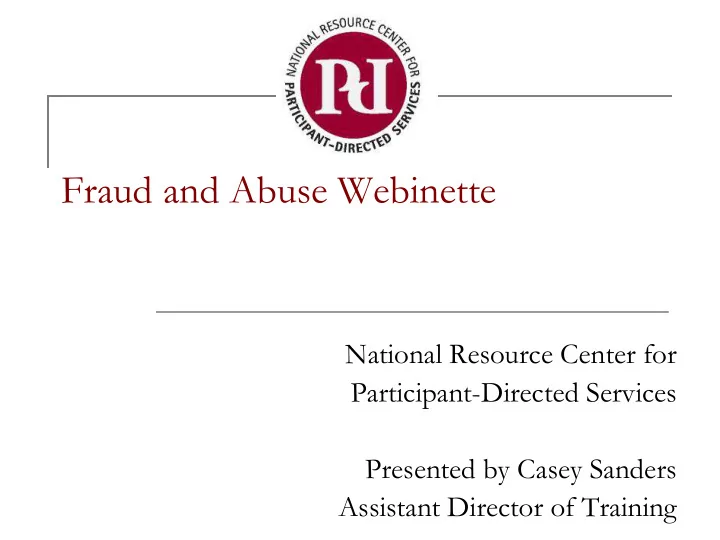

Fraud and Abuse Webinette National Resource Center for Participant-Directed Services Presented by Casey Sanders Assistant Director of Training
Definitions Fraud : the intent to deceive Abuse : an act of aggression by one person intended to inflict harm on another person Neglect : failing to provide services that are essential to the participant’s wellbeing Exploitation : taking advantage of the participant, worker, or system by misusing finances, trust, or resources 2
Common Myths MYTH: Participants do not have the ability to direct their own services, perform the responsibilities of an employer, or follow program rules and obligations 3
Common Myths MYTH: Participants are vulnerable and will categorically be taken advantage of 4
Common Myths MYTH: Workers with traditional, formal training do a better job than workers trained by the participants 5
Common Myths MYTH: Family members will not do quality work that a traditional agency worker does 6
There has been no evidence that participant direction leads to more fraud and abuse than the traditional system
Cash & Counseling Evaluation Results Built-in mechanisms are effective in preventing fraud and abuse FMS Counselor Representative 8
C&C participants were less to report problems with their caregivers, such as neglecting them, being disrespectful, and taking things without asking.
Directly hired workers in Cash & Counseling reported high levels of job satisfaction.
Many Western European countries have also implemented participant direction.
Real Examples of Fraud and Abuse When a participant dies Falsified timesheets Worker has access to personal finances 12
Identifying, Preventing and Managing Fraud and Abuse Clearly identify participant roles and responsibilities Provide information and training Ensure effective supports are available Conduct monitoring activities Establish effective communication paths 13
Clearly Identify Participant Roles and Responsibilities Enrollment Program operations Available support system and resources Reporting and documentation requirements Permissible and non-permissible goods and services How to file for a hearing or appeal Define fraud and abuse Consequences of failing to comply with program standards and requirements 14
Clearly Identify Participant Roles and Responsibilities (continued) Presentation Providing examples Roles and responsibilities discussed during each visit and written materials left in the home for review at a later time Participants encouraged to ask clarifying questions Create a checklist Participant Bill of Rights 15
Provide Information and Training How to successfully recruit, interview, and hire workers How to be an effective employer and supervisor Worker training Completing paperwork and timesheets States laws about fraud and abuse and mandatory reporting requirements 16
Ensure Effective Supports are Available Participant- FMS Directed Counselor 17
Effective Supports: Counselors Provides support and guidance Counselor Offers Links to explanation resources and clarification 18
Effective Supports: Counselors Counselors are not responsible for participant’s mistakes Counselors are responsible for identifying and correcting mistakes 19
Effective Supports: Counselor Recommendations Follow your program’s risk mitigation policy Document all interactions and observations Develop an adequate plan to provide services and supports Increase monitoring efforts when there is an indication of high risk After identifying fraud and abuse 20
Effective Supports: FMS Assists with managing resources Reports and Purchases withholds goods and payroll taxes services FMS Processes Documents payroll and tracks checks expenditures 21
Effective Supports: FMS Critical role in detecting abuse, neglect, and exploitation Responsible for making sure timesheets and purchases comply with what’s listed in the budget Identify inconsistencies or outliers 22
Conduct Monitoring Activities Responsibility Health & Wellbeing Traditional Agency Participant 23
Conduct Monitoring Activities Higher potential for Lower potential for fraud and abuse fraud and abuse 24
Establish Effective Communication Paths Case Participant Manager Other Service Counselor Providers FMS 25
Establish Effective Communication Paths: Recommendations Follow- up immediately when there is an indication of fraud and abuse Goal is to quickly identify the issue so that it can be corrected before it turns into a serious problem Need to know the appropriate reporting chains within your state 26
There are no indications that program misuse is greater with participant direction than other service delivery methods.
Advancing choice and control for people living with disabilities Please send your questions and comments to: info@participantdirection.org
Recommend
More recommend